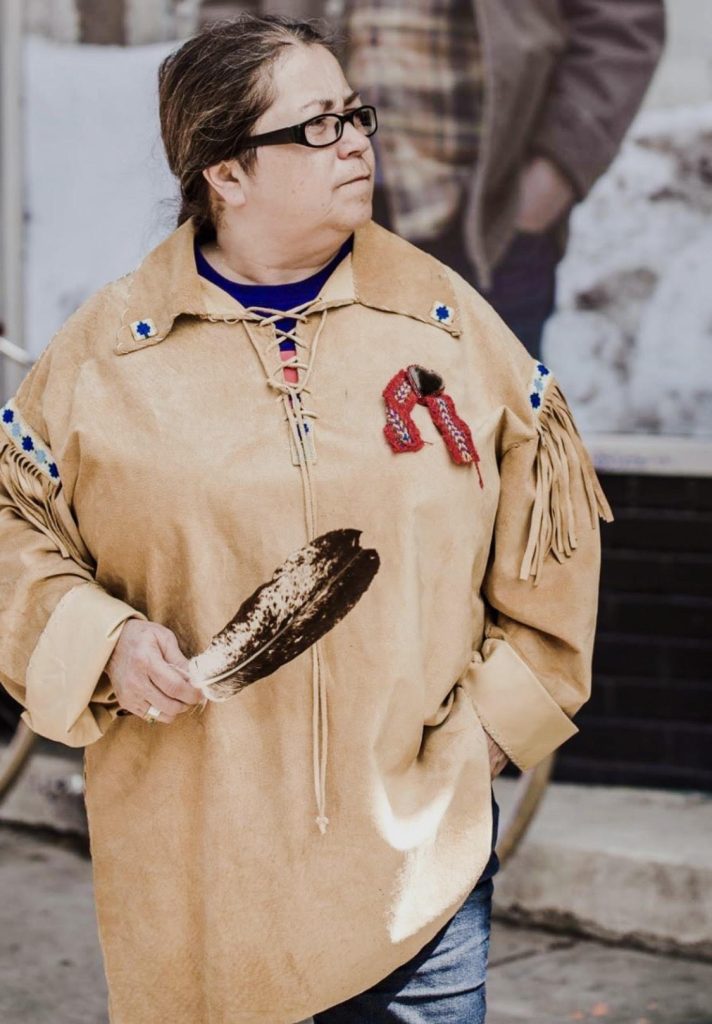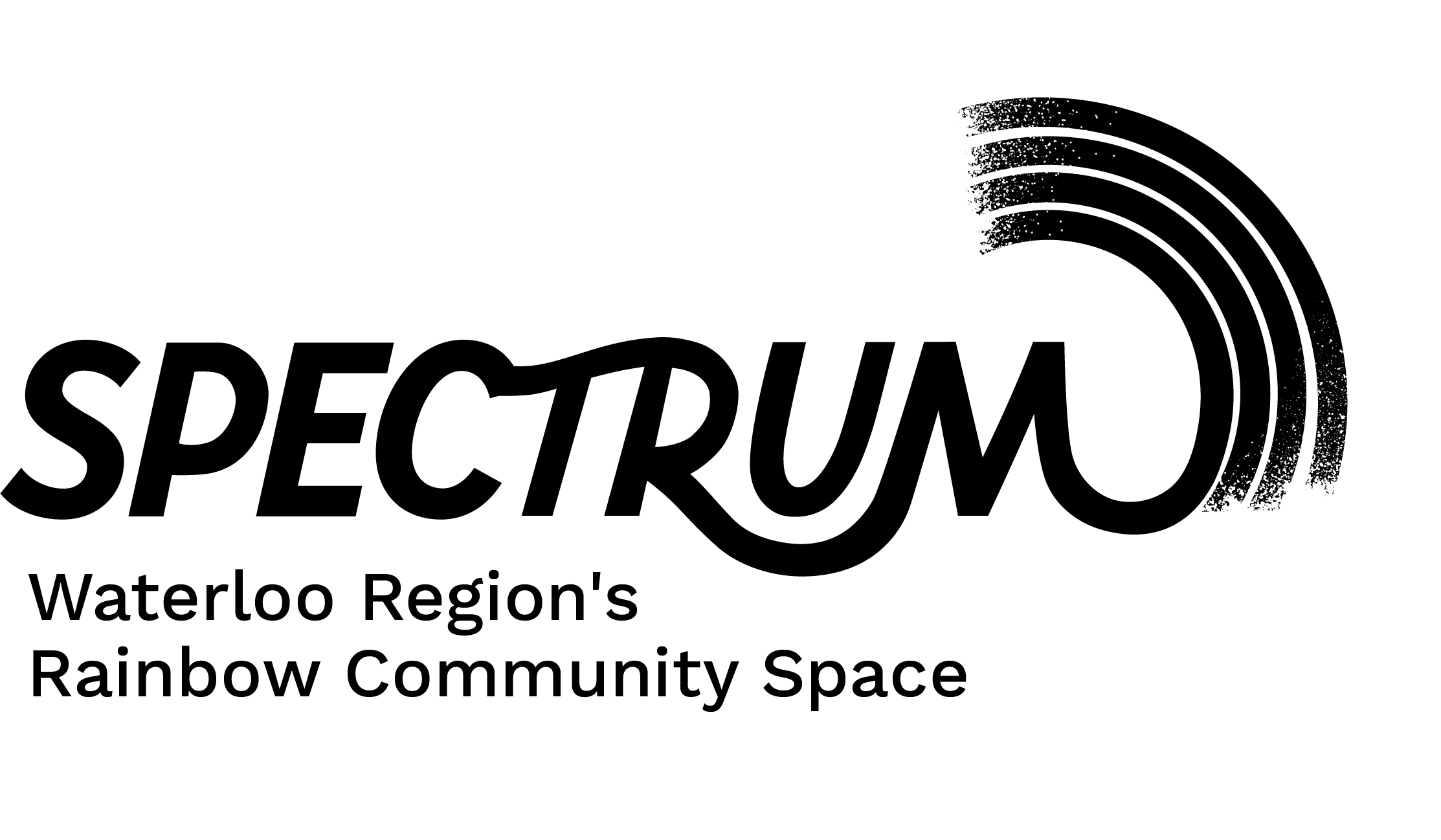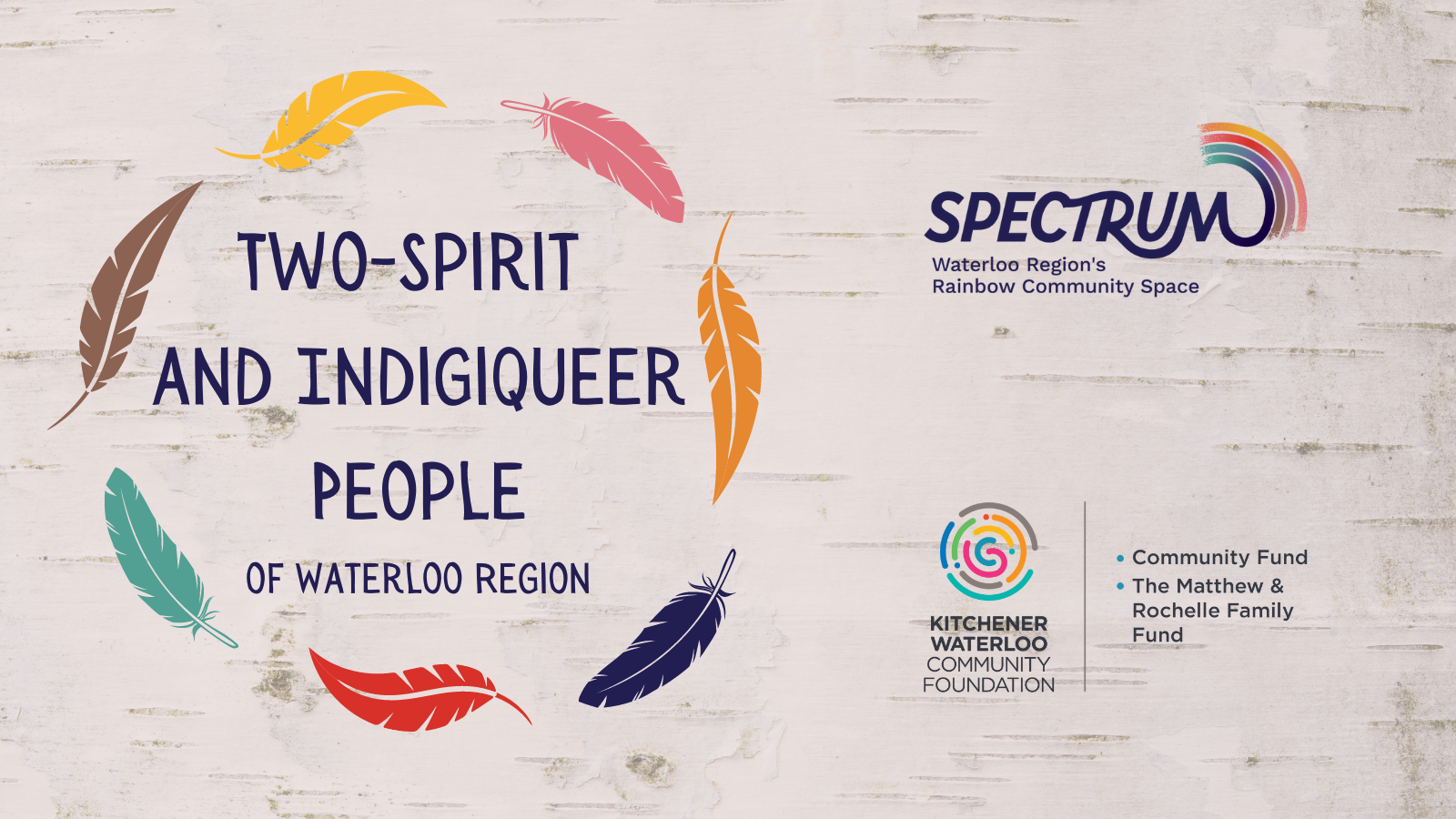SPECTRUM is grateful to have received a grant from the Kitchener Waterloo Community Foundation Community Fund, and The Matthew & Rochelle Family Fund to help us develop a new program for the Two-Spirit and Indigiqueer People of Waterloo Region. You can read more about the Racial Equity Fund and other grantees here.
Our work will begin with two community engagement sessions. These will be held virtually on February 15, 2022 and February 22, 2022 from 7-9pm. The sessions will be facilitated by Laureen (Blu) Waters (they/them): Istchii Nikamoon: Earth Song, Wolf clan. Cree/Metis/Micmac, Blu is a member of the Metis Nation of Ontario; and by Musko Giizhigo Ikwe (Red Sky Woman) (she/her) whose English name is Hollee George. Hollee is a Two-Spirit Anishinaabe Ikwe and a SPECTRUM board member.
If you are a Two-Spirit or Indigiqueer person in our community we hope you can join us to help us understand how SPECTRUM can better serve Two-Spirit and Indigiqueer people in what is colonially called Waterloo Region. SPECTRUM is committed to working towards reconciliation and ensuring that our programs, services, and practices are culturally relevant and accessible to Indigenous peoples in our community.
SPECTRUM acknowledges the truth that we are situated on the Haldimand Tract, which is the traditional land of Haudenosaunee and Mississauga Anishinaabe nations. We also recognise the Chinonton Peoples of what has come to be known as the Neutral Nations, a people entirely eliminated by the colonisation of this land.
The land on which we meet, live, love, and work is land that was originally shared with open arms by the Indigenous peoples who have always called this place home with the settlers of this region. We recognise that our presence here has disrupted thousands of years of culture and belonging. The very land upon which the SPECTRUM space exists is at the edge of a great wetland that served as a hunting ground and overwintering space, and is no more than a short distance from villages, feast and ceremony grounds, and settlements.
We also recognize that other Indigenous people from nations or countries beyond Turtle Island are here in Waterloo Region, sometimes because of the colonial legacy of homophobia and transphobia in their countries of origin, and we welcome them. These sessions will be led by Indigenous peoples of Turtle Island but are welcoming to all Indigiqueer people from all nations/countries.
Register here to participate in one of our virtual sessions:
- Register to attend February 15, 2022 7-9pm – Exclusively for Two-Spirit and Indigiqueer People
- Register to attend February 22, 2022 7-9pm – Open to Two-Spirit and Indigiqueer People AND Allies
The first 20 registrants for each session will receive either a $20 e-gift card, or a small medicine bundle. We will reach out to registrants to confirm which they would prefer.
We want to centre the voices of survivors of Indian Residential Schools, Indian Day School Survivors, the Sixties Scoop, and the Millennium Scoop. We acknowledge that discussing lived experience of trauma can be re-traumatizing and we would like to invite people in need of holistic or spiritual support to follow up with Hollee at hollee@ourspectrum.com
A National Indian Residential School Crisis Line has been set up to provide support for former Residential School students. You can access emotional and crisis referral services by calling 24-Hour National Crisis Line: 1.866.925.4419
These two engagement sessions are just the beginning of what we plan to do and we recognize that they will not be comprehensive. We plan for ongoing community engagement in a variety of forms. If you prefer to meet in a one on one setting to provide feedback please email us at info@ourspectrum.com and we will do our best to schedule something with you.
If you would like to help provide feedback but are unable to attend one of the engagement sessions please register anyway! After the sessions, we will email a survey to all who register and we would greatly appreciate your feedback at that time.

Laureen (Blu) Waters
Blu’s family is from Big River Saskatchewan, Star Blanket Reserve and Bra’dor Lake, Eskasoni First Nations, Cape Breton Nova Scotia, and the Red River. Blu grew up with their grandmother and learned about traditional medicines, learning healing methods and care of the sick. Their grandmother also shared her knowledge of the great teachings.
Blu is currently working at Seneca College as an Elder on campus providing traditional teachings and one-to-one counselling. Blu spent 2.5 years working for the National Inquiry for Murdered and Missing Women as a Grandmother to Commissioner Brian Eyelfson and sits on the Grandmother Circle. Blu sits on the Thunder Women Healing Lodge as a Director of the Board.
Blu also sits as the Ontario representative for Metis people with 2 Spirits In Motion Board. Blu also provides ceremony, teaching, and counselling for 2 Spirit People of the First Nations, in Toronto.
Blu was also the national caucus representative for the Toronto Urban Aboriginal strategies for five years working with the community of Toronto and the government. They are also a graduate of DeVry Institute of Technology receiving their business software micro-computer architecture and A+ certification.
Blu’s gifts include: Traditional teachings, giving traditional spirit names, hand drumming, song writer, creative writings, and full moon conductor. Pipe ceremonies and sweat lodge ceremonies and Traditional counselling. Blu is a 2 spirit person, a mother of 3, a grandmother of 3, a sun dancer, and a pipe carrier.
Hollee George (she/her)
Musko Giizhigo Ikwe (Red Sky Woman) or Hollee George’s spirit name means new days or new beginnings and she belongs to the Sturgeon Clan which is a teaching clan. She is a registered section 6(1) status Indian and band member of the Chippewas of Kettle and Stony Point First Nation, located in Southwestern Ontario. She identifies as a Two-Spirit Anishinaabe Ikwe and lesbian. She is a mother, a daughter, a granddaughter, a sister, an auntie, a niece and a cousin. She is a knowledge keeper, carrier of ceremony, a Jingle dress dancer, and a political and social activist.
As a political and social activist, she has taken two systems of governance to the Federal and Provincial Human Rights Commissions. She recently settled a case of discrimination against Two-Spirit people in her home First Nation community and is now working toward holding London Health Sciences Centre accountable for their discrimination and harm caused.
Her post secondary education, employment background and passion is largely Criminal Justice but she has worked in other systems of law that affect Indigenous and queer people. From 2008 – 2019, she pioneered comprehensive Gladue casework as an independent Indigenous entrepreneur across the Province of Ontario. She has worked with two Indigenous dangerous offenders in Canada and her criminal Justice work has been held in high esteem and been presented, on request, to the Ontario Court of Appeal on two occasions.
She furthered her career in legal services by also pioneering Gladue casework in various community legal services clinics across the Province of Ontario; and that legacy remains alive today. She has been a Provincial Inmate Liaison Officer, Child Protection Family Services Worker and Indigenous Child Welfare Services Manager on reserve. She brings a wide perspective and passion for care of the community.
Today, she lives, works and plays on the Haldimand Tract and the City of Kitchener has been her place of residence for almost five years. She lives, works and plays in the queer rainbow community and gives her time to SPECTRUM as a Director and knowledge keeper, Breaking the Silence with Grand Valley Institute, The Social Development Centre Waterloo Region and The KW Multicultural Centre. She is also a student of Indigenous empowerment coaching and though she started her post secondary career in the 90s at Sault College, she is still a student at the University of Western Ontario today.
It is her honour and traditional role and responsibility to continue the work of helping and healing self, family and community.



